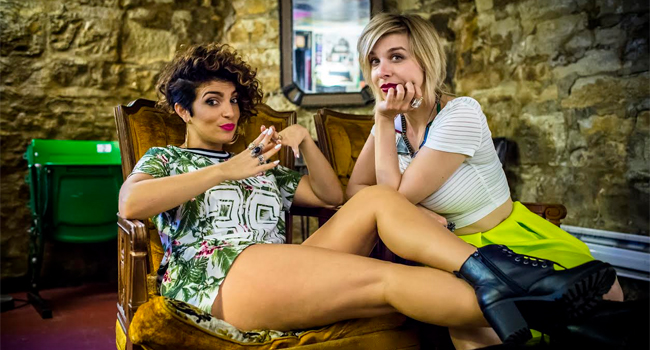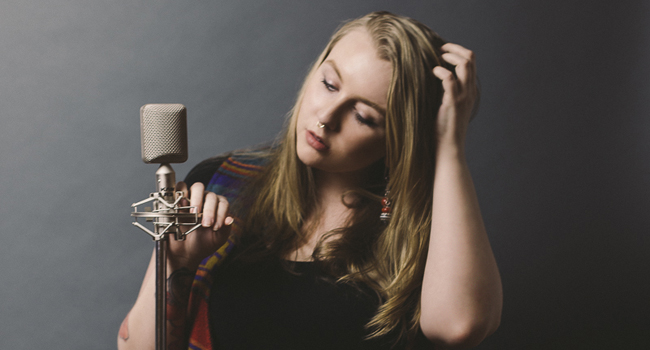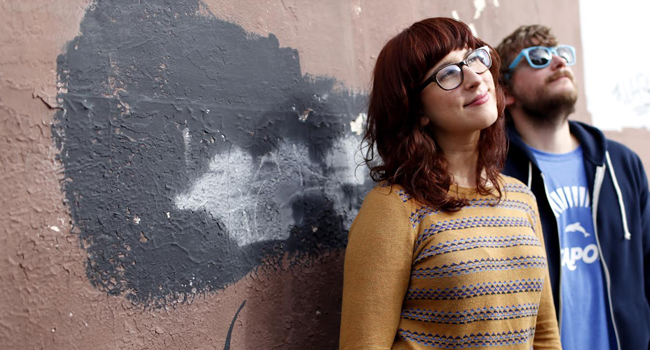It’s been a little while since DIY-indie-folk musician Mirah (whose full name is Mirah Yom Tov Zeitlyn) released her last solo album, (a)spera, in 2009, but she’s been keeping more than busy in the meantime. After living on the West Coast and in the Pacific Northwest for more than twenty years, she picked up and moved to New York in 2009 following the end of a long-term relationship. She spent time collaborating and touring with musicians like Phil Elverum of the Microphones/Mount. Eerie, Merrill Garbus of tUnE-yArDs, and Thao Nguyen of Thao & the Get Down Stay Down, and formed her own record label, Absolute Magnitude, with support from K Records.
The result of all these major life changes was a series of songs that became her fifth solo album, Changing Light, which will be released May 13.
Pop ‘stache recently spent time with Mirah over the phone while she sat on a roof in Brooklyn and talked about her new home in New York City, the upcoming tour for her new album, the limitations of the term “singer-songwriter” and why “cute” isn’t always a compliment.
Pop ‘stache: I read you moved to Brooklyn to live there for a year as a sort of “project,” to see if you could do it.
Mirah: I can imagine that I described it that way at first, because part of moving to NY was a project of living somewhere specific, instead of continuing to move around every couple of months. My project was to move in somewhere, to live somewhere. [Laughs.] I started living here part-time two and a half years ago, until I did a year part-time, and that was part of what led me to that project. I hadn’t really committed to anything related to my living situation in several years, so the project was to find an apartment and sign a lease. It was sort of a big deal. When I signed the lease a year and a half ago, it was after having one foot out the door of all the other places, until I was like, “No! Both feet! Planted down! Here, now!”
P’s: Was that nerve wracking, to finally commit to just one place?
M: No, it felt good!
P’s: So what has it been like for you, living in NY? I know you grew up on the East Coast anyway, so you were always kind of close by.
M: Yeah! It feels very comfortable.
It wasn’t difficult to move here; it was actually easy to move here, so I took that as a good sign.
P’s: When does the tour for the new album start?
M: It starts on the 13th of May, on the record release date—the day that the record is finally released. Our first date is in Cleveland, Ohio, which is wonderful. What I’m excited about in this next tour is playing in a couple cities and towns that I haven’t played in for a while. I love traveling around and playing shows, and I really love playing shows in smaller cities in town, not the major market towns. The first eight or 10 years I was touring, it was all DIY touring. We would just drive around in our car and go to little towns all over the place, and play for 20-50 people, and it was great. I loved not having as long of drives, and being really welcomed in a very personal way in all these places, and I kind of miss that. So I’m excited to do some more extensive touring on the new record, which will include some of those medium-sized cities and towns.
P’s: You’re going to be in Evanston the day after you start the tour, on the 14th? I saw you and Thao play at Lincoln Hall a couple years ago.
M: Oh yeah, that was a fun show! I think those were a good couple tours that we did, and I feel really proud of that record that we made together. I really love it a lot.
P’s: It’s a great album. You and Thao seem like such a good match for each other musically—how did you end up working together?
M: Well, we were introduced over email. The whole idea for that record [Thao & Mirah] came from a mutual friend of ours who told me, “You should make an album with Thao!” I had just moved to the Bay Area, and Thao and I met up for the first time. Because the idea of working together was part of our introduction to each other, it was already a topic on the table from the first time we met, but it seemed so obvious. I guess maybe because we’re both “singer-songwriters” … but I have a strange relationship with that term. It is what I do, it is what I am, but mostly, I rely on it as an easy way to not actually describe myself as I feel myself to be. It’s just sort of a convenient, generic catch-all term, sort of like if someone tells you that they’re in an “indie” band. It mostly feels like those terms are only useful in order to get to the more interesting part of the conversation.
I can never answer the question, “What kind of music do you play? What does your music sound like?” It sounds so impossible! I’m me! I’m myself, and I can’t describe it! I have no idea how to describe it. There’s also this other whole pressure of, “Oh, this is the moment where I’m supposed to make myself sound really interesting, make the musical experience sound like something so tasty that the person who is reading this couldn’t possibly go home without trying it out.”
And I just feel like… Come on! That’s why I make music! That’s the whole thing! I already made this thing for you to consume. [Laughs.] Go consume it! Let me live my life!
P’s: Will Changing Light be your first release on your new record label, Absolute Magnitude?
M: Yeah, this is the first record I’m releasing on my own. I do have support and I have a distributor, and a bunch of people who provide certain kinds of assistance, but I’m the one trying to balance everything. It’s a good challenge. [Laughs.]
P’s: When did you decide to start your own label?
M: Well, I moved away from the [Pacific] Northwest a couple years ago, in 2009, and I had this idea to put out a record on another label. I’d been putting out records with K, and then my and Thao’s record came out on Kill Rock Stars, and those are both Northwest labels. In my travels, and moving around, and starting to live in NY, I was interested in the possibility of releasing a record on another label. I am from Philadelphia and the East Coast originally, but I lived on the West Coast for 20 years. I was in the Northwest for all of my twenties and into my early thirties, which was a pretty formative time, and I feel like I grew up there. I had my community in the Northwest and family—K felt like family—and I was starting to feel like, “Hmm, now I’m really growing up, I’m well into my thirties, and now I don’t even live [in the Northwest] anymore—maybe it’s time to individuate.” That idea, at a certain point, changed from just looking for another label to, “I’m just going to put the record out myself.”
And again, that whole process was gradual. After I left Portland, I actually started writing some of the songs for this new record and making some of the demos, a number of which ended up becoming the basic tracks for the album. So, I have essentially been working on Changing Light for four years, and after the process of moving away and finally ending up in NY, it really only made sense, at that point, to release it myself. It felt like, “All right! Looking back at the last four years… who built this?” I wasn’t without help—I had lots of help from a lot of amazing, totally supportive people that I couldn’t have done it without, but I started realizing that it didn’t make sense for me to find a label at that point, because they wouldn’t have been part of the process at all. I was here every moment of it.
P’s: Are those feelings at all related to how you came up with the name for label, “Absolute Magnitude”? What does it mean to you?
M: Oh, well, it’s really hard to name things these days, because you’ll have an idea and think, “Wow, that’s such a great idea! I’ll google it just to make sure I’m the only one who had that idea!” And of course you check and there’s ten billion people who already had the idea and that name has been used for like, this product and that production company, and this airplane manufacturer, or whatever.
So the name for the label kind of happened the way that I write songs sometimes. You just start moving your mouth, and if you’re strumming your guitar, then you start singing a melody, and then there’s a consonant that happens next to a vowel, and then you realize, “Oh, that’s that word!” And it is related, it is meaningful, because you’re expressing through sound, in a subconscious way, some word or feeling or thought, but you have to let it surface.
A lot of the time songs can begin by letting them surface, rather than reaching in and trying to grab something by the neck.
For the name of the label, I was searching around for images and words and I ended up thinking about words related to outer space, and I came upon the phrase “absolute magnitude,” which means, “the measure of the intrinsic brightness of a celestial body.” It’s so good. Also—I feel really happy about this—I got tweeted at by this astronomer who teaches at Rutgers who said he loved the name of my record label. It made me so happy, it totally made my month.
P’s: You’ve mentioned how Changing Light took four years to make. Was that because you wanted to take your time with it?
M: It was more because of the way that my life was in those four years. I was going through a lot of transitions personally, and that manifested in a lot of transitions in my living situation: moving from Portland to San Francisco to New York. During that whole period of time, I was very free, but I was also very unsettled, and that just didn’t prove to be a good recipe for me to focus on finishing anything. I was just exploring other things. It never got totally put on the back burner, but there would only be these certain windows of time where I would have an opportunity to work on it. I just was sort of spending time with myself, working through some stuff. [Laughs.]
P’s: The press release for Changing Light described it as a breakup album. You’ve obviously written songs about breakups in the past—how is the music and writing in this album different from your previous music exploring those same themes?
M: Well, [breaking up] was a main theme in the four year transition period I was describing. My departure from Portland, and my subsequent several years of moving around a lot and not being settled, was all on the heels of the breakup of a long relationship. And sure, I had been through breakups before, and so I had written songs about that before, but none of them chronicled the experience in a cohesive way that included a settling and coming around to feelings of forgiveness, of having gone through the fire.
It’s not a breakup album, it’s not like Taylor Swift or something. Usually albums like that are pretty angry. And sure, anger is obviously a part of it—pretty much everyone has had an experience with a breakup at least once, and is familiar with that anger. There are other experiences that lead you to be familiar with anger as well, but that’s one that’s pretty universal.
P’s: It’s a very specific form of anger.
M: And it’s a very specific kind, yeah. “Goat Shepherd” is the first song on the record because it’s one of the first ones that I wrote for the album. So again, this album is chronicling a four year period of time when I was really transitioning through a lot. I wasn’t angry for four years. Right now, I’m actually super happy, but “Goat Shepherd” is about anger, so that one had to go first. [Laughs.] So I thought, “Great, let’s put that one first, this hot, angry, short song, and then you can move on through the rest of the process.”
There’s three singles—”Oxen Hope” is the third song on the record, “Goat Shepherd” is also one of the singles, and actually, the second single that was released is the last song on the record, “Radiomind,” and it’s the happy ending one, the “Hey, now Mirah lives in New York, is in love, and she’s happy.”
P’s: How do you feel the record has evolved musically from your previous work?
M: I was experimenting with some other production styles and production techniques with my vocals more than I have in the past. I definitely paid a lot of attention to vocals this time, but with my first three solo records, a lot of my earlier recordings were done on analog equipment, tape to tape, and so there are these great sonic palettes you can access when you use tape, but also certain limitations that you work within. We did use some analog recording equipment for effect with this album, but essentially, by and large, the last two records, Thao & Mirah and Changing Light, were recorded using Pro Tools, and so there are some different options and different kinds of limitations when you use that, and so that opened up the possibility to make certain choices which I hadn’t had in the past.
P’s: On a different note, you get described as “sweet” and “cute” on a regular basis. I see those adjectives a lot whenever I read about you.
M: [Laughs.]
P’s: I was wondering how you balance that perception with feeling like you’re being taken seriously in music and in other things.
M: Yeah, that’s a good question. What’s funny is, people who know me know that I can totally be scary. [Laughs.] Like, a lot! I’m not always sweet and cute. It’s sort of like, “You know what, people? If I was tall, you probably wouldn’t say that as much!” [Laughs.] I think short people get that “cute” put on them a lot.
P’s: How tall are you?
M: I”m not that short. I’m 5’2”. I’m not an extremely small woman, but I’m small. And one thing I will say is that because, for the first 10 or so years of being a musician, I was based in Olympia and Portland. I started making music in the late ’90s, which was the prime time and location to be a female musician and feel really supported, and not have to be confronted, at least daily, with the sexism that’s rampant—not just in the music industry, but everywhere. It was a really empowering time for female musicians. That’s the environment I came up in as a musician, and that was an extreme privilege that I had. If I had been in New York during that time, or definitely if I’d been in Philadelphia or a lot of other places, I would have experienced a lot more sexism and not as much support. But you know, it still existed, and I was traveling all over the place playing music.
I haven’t had any extreme examples of being really disrespected, because I’m a woman making music. I’ve had sound guys who sort of treat me like I don’t know what I’m doing. I’m also often read as being much younger than I am, because I’m smiley! I’m smiley, I’m friendly, I’m short, and I’m a woman. [Laughs.] And somehow that all translates into—I also don’t have a very aged-looking face—so I’m often read for being at least a decade younger than I am. Sometimes this can be useful, and sometimes this makes me feel mad! [Laughs.]
Sometimes I feel like, “Actually, I’m 39, can you please treat me like a grownup?”
P’s: And does it bother you when you do get those adjectives like “cute,” “adorable” or “sweet”?
M: Yeah, I mean… it can be cloying, and it can feel disrespectful. Like with a lot of things, the delivery or the context can make a really big difference. It can be a little strange, because I don’t feel that cute about my music. I don’t feel like it’s that cute. I’ve been making music for 15 years, and sure, there’s plenty of YouTube footage of me looking ridiculous and very young, singing cute songs that I wrote when I was 23. And I am the same person, but I have grown up, and I’ve continued to write songs all these years. I’ve gone through a lot of experiences that have contributed to my development as a human being. I try to incorporate these things into my songwriting, into my voice and into my recordings.
So you know, I like to think I’ve developed as a human, as a songwriter and as a recording artist. So I think sometimes, when people insist on the “cute” label for me—they’re not aware that they’re doing it sometimes, but they’re really speaking from a historical perspective. And it’s just like, “Hey! It’s 2014, I’m 39!” [Laughs.]
P’s: Get with it. Catch up!
M: Yeah. Yeah!
Mirah will be playing at SPACE in Evanston on Wednesday, May 14.



